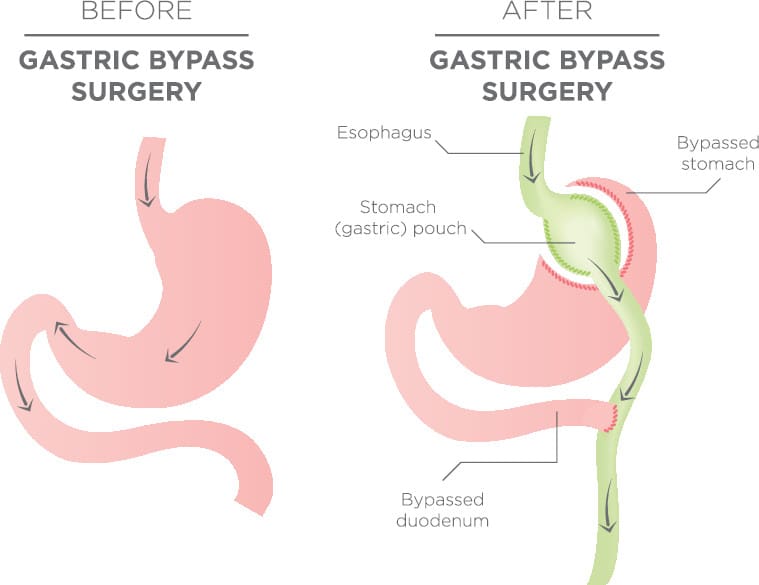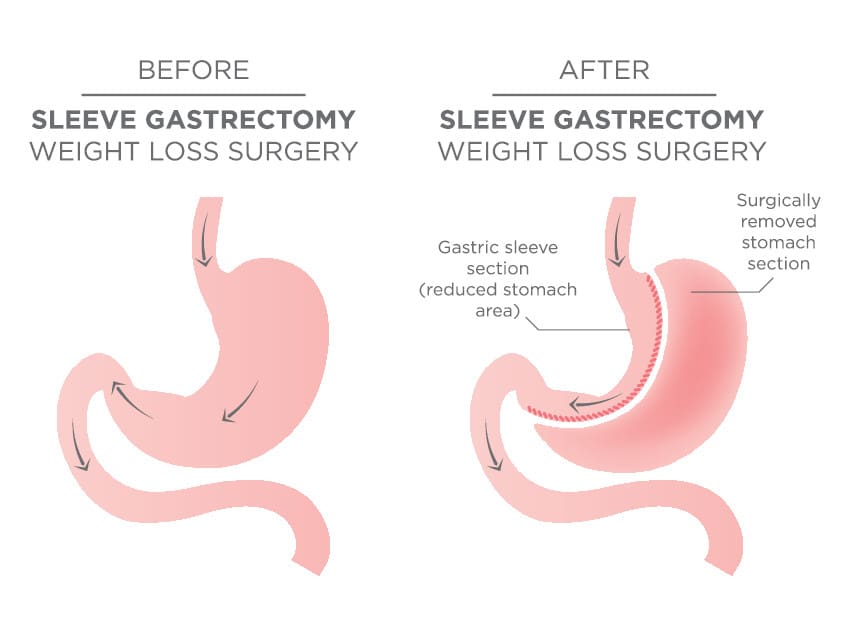As an experienced weight loss surgeon and Medical Director of JourneyLite Surgery Center, I have performed thousands of weight loss procedures over my 20-year career. Gastric gastric bypass vs. gastric sleeve is a common discussion I have with patients. Below, I will walk you through the differences between these surgeries from how they work to recovery times to risk and more.
What is Gastric Bypass Surgery?
Roux-en-Y gastric bypass surgery is a weight loss procedure in which that involves creating a small stomach pouch and rerouting a portion of the small intestine. Here’s a simple explanation:
- A small pouch is formed at the top of the stomach.
- The small intestine is cut a few feet below the stomach.
- The cut end of the intestine is attached to the new stomach pouch.
- The other end of the divided intestine is connected further down to the intestine that leads to the pouch.
Gastric bypass surgery has been around for decades and was first performed in the 1950’s. Originally, the procedure was done with a very large incision and patients spent upwards of a week in the hospital. Nowadays it’s done with multiple tiny incisions (we call this “laparoscopic surgery”) and patients usually can go home the next day. Advances in technology have really decreased the complication rate of laparoscopic gastric bypass as compared to the old open technique.
How Does Gastric Bypass Help People Lose Weight?
Regardless of how the operation is done, it leads to weight loss through a few different ways:
- The newly-created small pouch fills up very quickly. When the top of the stomach (where the pouch is located) is filled with food, it sends a sensation of fullness to the brain. Hence, the patient has smaller portion sizes after surgery.
- Prior to surgery, ingested food and digestive enzymes mix together almost immediately, as soon as the food leaves the stomach. After a RNY, though, each are kept in separate channels of intestine until the “Y” connection occurs. This leads to minimal digestion or calorie absorption in this bypassed area. Therefore, the patient does not absorb every calorie they consume.
- Lastly, there are hormonal changes like a reduction in Ghrelin (known as the hunger hormone) that occur after a bypass, leading to an overall decrease in hunger after surgery.
What is Gastric Sleeve Surgery?
Vertical Sleeve Gastrectomy (VSG surgery) is a less-invasive surgical weight loss procedure known for its effectiveness in promoting substantial weight loss and low long-term risk. Here’s an overview of how it works:
- Stomach Size Reduction: A large portion of the stomach is surgically removed. What remains is a narrow, sleeve-like stomach.
- Decreased Food Capacity: This newly shaped stomach can hold much less food, which greatly reduces both hunger and the amount of food you can eat.
- No Intestinal Alteration: Unlike some other weight loss surgeries, VSG does not involve changing the path of the intestines.
Gastric sleeve surgery is a popular choice for individuals seeking a less complex surgical solution for weight loss.
Although the gastric sleeve (also known as VSG) has been around at least since the 1980’s, overall it’s a newer procedure. Originally it was performed as part of a more complicated operation known as the duodenal switch. Now it’s done as a standalone procedure in most cases. Unfortunately, using the term “sleeve” sounds like we are putting some sort of an object into the patient called a “sleeve,” but that’s not the case. Sleeve is actually a descriptive term regarding what is done during the operation. We remove the majority of the side part of the stomach during a VSG, leaving a long narrow tube afterwards that is akin to a sleeve on a jacket.
Why is Gastric Sleeve Surgery so Popular?
Unlike in a gastric bypass, we do absolutely nothing to the small intestine. This has pros and cons which I’ll discuss below.
- As it is a much simpler, less-invasive operation, the short- and long-term risks are lower than for gastric bypass. This is what has led to the VSG becoming the most popular weight-loss operation world-wide.
- Since no intestine is bypassed, the risk of vitamin and nutrient deficiencies is much less with gastric sleeve than with gastric bypass.
Key Differences Between Gastric Bypass and Gastric Sleeve
When considering gastric bypass vs. gastric sleeve, there are a couple of important differences. The most important distinction is that the bypass is a malabsorptive procedure. As we are excluding a decent amount of small intestine in a bypass, we are causing your body to absorb fewer calories; hence the term “malabsorption.” While this can help from a weight loss standpoint, it can also increase the risk of long-term complications. Your body will not only be malabsorbing calories, but also vitamins and other nutrients as well.
So the risk of vitamin and nutrient deficiencies is higher after a RNY gastric bypass than after a VSG. The risk of hypoglycemia (low blood sugar) is also more common after a bypass, as well as iron-deficiency anemia and dumping syndrome. This added level of weight loss power that a RNY provides comes with a cost, therefore we try to reserve the choice of bypass over sleeve for patients who have a higher body mass index as they may need this extra boost, such as those with a really high BMI or in severe cases of type 2 diabetes.
Advantages of Gastric Bypass
- Overall better weight loss, especially for higher-BMI patients
- Lower chance of needing an additional weight loss procedure down the road
- Less GERD/reflux issues
- Slightly better long-term type 2 diabetes resolution
- Optimal revisional procedure for gastric sleeve patients with bile reflux or GERD problems
Advantages of Gastric Sleeve
- Shorter operation
- Can be done as an outpatient
- Faster recovery time
- Lower risk of nutrient and iron deficiencies
- Lower risk of hypoglycemia (low blood sugar)
- Easily revisable down the road
Gastric Bypass vs Gastric Sleeve: Patient Eligibility
Patient eligibility is similar for both operations. After 30 years, the American Society of Metabolic and Bariatric Surgery just updated their guidelines for who should qualify for weight loss surgery in 2022. As the risk of weight loss surgery has decreased dramatically since the original guidelines were released, the new recommendations lower the threshold for bariatric surgery.
Originally, a patient had to have either:
- a body mass index (BMI) over 40
- a BMI of 35-40 with significant weight-related medical issues (e.g. diabetes, sleep apnea, etc)
Under the new guidelines, BMI requirements are lowered to:
- a BMI over 35, regardless of medical conditions
- a BMI of 30-35 with significant weight-related medical issues (e.g. diabetes, sleep apnea, etc)
Although insurance carriers haven’t yet necessarily taken up these new guidelines, with time they should greatly increase access to care for bariatric surgery. It’s currently estimated that only about 1% of patients in the United States who would benefit from weight loss surgery actually have it done.
Other factors are also taken into consideration such as a patients age, medical risk, and ability to commit to long-term lifestyle changes necessary for success after surgery.
Gastric Bypass vs Gastric Sleeve: Weight Loss Results
The gastric bypass is a more powerful procedure than a gastric sleeve, therefore usually the weight loss is better. The difference becomes greater as BMI increases, so for a patient with a 30 BMI the difference may be minimal or even the same. For a patient with a 70 BMI, gastric bypass would provide significantly better weight loss.
Gastric Bypass vs Gastric Sleeve: Risks
As the VSG is a simpler procedure, it has a lower short-term and long-term risk than a gastric bypass.
Sleeve vs Bypass: Which is Better?
There is really no way to say which procedure is “better” or “worse.” As with most things in surgery, the goal is to choose the lowest risk procedure which will achieve the patient’s goals. This is why you should choose an experienced team like JourneyLite, as during your initial consultation all the factors that play in to your success are taken into consideration to determine the best individualized plan for you.
Gastric Sleeve vs Bypass FAQs
What determines who should get a VSG vs. a gastric bypass?
This is usually determined by the patient and surgeon at the initial consultation. Your surgeon will analyze multiple factors such as your BMI, weight-related medical conditions, and other factors.
Will I have to take vitamin supplements after a sleeve or a bypass?
Yes. After weight loss surgery a patient will be eating much smaller portions, and therefore will be taking in smaller amounts of vitamins and nutrients in the food they eat. Post-op vitamins are therefore important for all patients after bariatric surgery. They are especially important for gastric bypass patients however because not only are they getting less dietary vitamins in the food they eat, but there is a significant amount of small intestine that is bypassed. This means that a bypass patient will not only consume less dietary vitamins, they will also not absorb all the dietary vitamins they consume.
Which procedure has the fastest recovery time?
All of the procedures at JourneyLite are done with a minimally invasive technique. Therefore, the recovery is much quicker than in past days when large incisions were used. Most patients with desk jobs can be back to work in a week or two. For lifting jobs it’s more like 3-4 weeks. Although recovery is similar, sleeve patients typically skew towards the shorter end of these ranges.
Does the sleeve or bypass "stretch" after surgery back to a normal size?
It would be nearly unheard of for the new anatomy after a sleeve or a bypass to stretch back to a pre-surgery size! All patients will experience some degree of an increase in portion size over the first year after surgery. This is normal and not concerning as we don’t want a patient to continue to lose weight forever. In a small percentage of patients who do not follow the dietary guidelines after surgery, the anatomy can enlarge to the point of significant weight regain. This is why it’s very important to attend all of your post-op visits after surgery!






